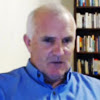
Bede Clifford
This is the first of an ongoing series written by Bede Clifford. Bede is a student of Swamini Atmaprakasananda. He comes to Vedanta from a background of Theology, Philosophy, Sociology & Psychology.
Click here to view Bede Clifford’s YouTube channel
To start at the beginning of this series, click here.
Being a Student of Vedanta Part 3
“This is what we call samsara- the dependence upon another person, another situation, for your own sense of well-being” Swami Dayananda.
So here I was living in the context of complete and utter dependence on objects other than myself and trying to get a sense of well being from them. According to this Indian teacher my entire life was built around this but I did not know it and I did not know that I didn’t know it. It was only in the presence of certain experiences (objects) and the absence of certain other experiences (objects ) did I feel secure, peaceful and happy. What could I say this was true.
What was being suggested here was that there was a sense of well being (security, peace and happiness) that stands alone in and as itself. A well being which is unshakable in the face of any circumstance even such extreme extreme ones like failure, social rejection, imprisonment, the physical pain of sickness and the fact of and experience of death. A well being which could not be acquired by effort but was ever present as the truth of myself. It was also pointed out that the only distance between myself and this absolute freedom was ignorance. Not the world. Not other people. Not even myself. There was something very important I was not seeing and the only solution was seeing it.
I didn’t even recognise the existential condition of samsara let alone have any notions of its solution. I just wanted to be happy. Freedom from dependence was not my issue. My emotional upsets and unhappiness lay with things other than my self. The relief from these things also lay with things other than myself. At the time this basic conclusion or notion seemed fairly obvious. This was my entrenched standpoint on life. This was the context in which I “lived moved and had my being” but it as a context was entirely hidden from me though it determined entirely how I lived in the world. .
This was my first encounter with the standpoint of the Vedanta scriptures. They were scriptures that weren’t telling me what to do but rather what to see. Frankly from my Christian Judaic background scriptures used in this way is unknown. In the light of this scripture I could see myself and my situation in an entirely different way. From my own standpoint life looked one way. From the standpoint of the Vedantic scriptures it looked entirely different. I did not know I was seeing my life in the light of the Vedantic Vision. I was talking to a stranger who was unfolding a way of seeing which was entirely new to me. I was yet to appreciate she was the scriptures in living form. I wasn’t Indian so I didn’t know about such things.
In this first conversation I asked Swamini what was the best way to approach this problem of dependence on objects. She said that I must depend on the guru, scripture and God. I could already see that talking to her opened my eyes to things that I could not see myself. Depending on my own standpoint had proved to be very unhelpful given my emotional misery at the time. I knew the teaching was from the Vedantic scriptures so I thought that was acceptable. The God thing was hard. I just wanted the teaching without the religious stuff. I knew from her photos she was some kind of Hindu monk because she wore yellow clothing. Also she was often surrounded by Hindu deities which made me uncomfortable. I could not understand how she could have such clarity about life and living but be so religious and prayerful at the same time. I had rejected prayer long ago. Also I didn’t have a religious bone in my body. However I set aside all my misgivings about that and just stuck to what did make sense which was what she had unfolded so clearly to me . I was desperate at the time so I had nothing to lose.
So at the end of that conversation I was prepared to depend on her as a teacher. Not only was she wise she was also very kind. I was a stranger to her of a different race and a different culture. Yet she was willing to talk to me and she had such a accepting manner about her I could speak frankly without reservation. I opened up like a clam which was unusual for me. After the first conversation I didn’t feel as helpless and as unhappy as before we talked. I knew I had finally come across something good. Looking back I had no idea what I was getting myself into.
